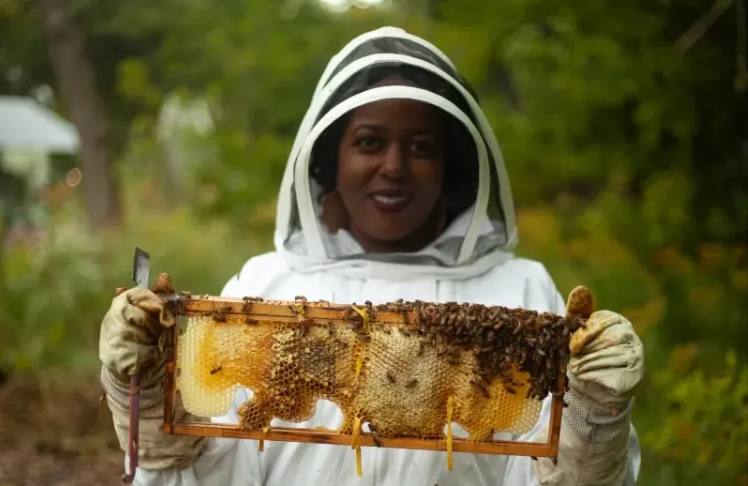
Even though there are about 100,000 beekeepers in the United States, we rarely see Black folks as the face of beekeeping. But Black beekeepers say working with pollinators isn’t only for white people.
“Most people think beekeeping is a white thing. It’s a part of our culture. It’s nothing new,” says Timothy Paule Jackson, who co-founded Detroit Hives with his partner Nicole Lindsey in April 2016.
“We have a history of beekeeping,” he says.
Jackson became interested in beekeeping when he used local raw honey to treat a cold and has now kept bees for over seven years. His Black and Indigenous-led organization transforms vacant lots into spaces for pollinators and wildflowers.
In the winter of 2016, Jackson’s partner Nicole Lindsey suggested that they begin converting vacant lots into beekeeping hubs. They founded Detroit Hives to create multi-generational opportunities for Black people and their children through beekeeping. Through Detroit Hives, they also founded National Urban Beekeeping Day in 2019.
A Black Legacy of Beekeeping
Black folk have a long history of beekeeping in the United States.
But the California-based Black Hives Matter Project noted that “It is unsettling that a google search of the history of African American beekeepers turns up almost nothing.”
The project explained that what is referred to as the ‘European’ Honey Bee was actually “brought to this continent by way of the Virginian colony in 1622, shortly after the first enslaved African peoples arrived in Virginia in 1619.”
The project goes on to note that “The enslaved peoples of Africa were the force behind most of the agriculture in what would become America” — meaning that “enslaved Africans were beekeepers in North America is self evident.”
At the turn of the century, Tuskegee University added beekeeping to its curriculum. Instructors included prominent Black folks like George Washington Carver, who heavily advocated for beekeeping education for Black farmers.
It turns out Jackson’s family actually has a history of beekeeping. Last year, he found out that his great-grandfather was a beekeeper in Greenville, South Carolina.
A Connection to Farming
Along with nurturing bees, the Farmer’s Conference also started in Tuskegee in 1892. It is the longest-running farming conference in the United States. But land ownership and beekeeping in Black communities dwindled over time.
For Kamal Bell, the founder of Sankofa Farms, owning land and working with bees on that land has been a way to heal from racial trauma.
“It’s a way for us to heal and mend our relationship to the land,” Bell says.
“It gives you a better understanding of mother nature. I think it’s natural therapy for us.”
The North Carolina native also says spending time with his sons outside with the bees is a potential opportunity for multi-generational farm ownership.
Not many Black people own farmland in the United States. Black farmers lost an estimated $326 billion worth of acreage during the 20th century. Losing land is a contributor to the racial wealth gap in this country.
But is there racism in beekeeping? In 2020, the Facebook page for “They Keep Bees,” a Massachusetts-based farm, posted that “Beekeeping, like most agriculture in the US, is inherently racist.”
They Keep Bees pointed out that beekeeping, as we currently know it is a method “founded by colonizers and used to propagate industrial agriculture. When we say #savethebees we’re actually saying save industrial agriculture and commercial pollination that uses bees as a tool rather than learning from bees as an ally. The tradition and practices of beekeeping in the US need an overhaul to move beyond white supremacist frameworks.
As for Jackson, he says beekeeping “is open to all races and backgrounds. If you don’t see it, you don’t think it’s possible.” Having Black people in the space matters. “Representation matters,” he says.” We are just connecting to what our ancestors have already done.”















